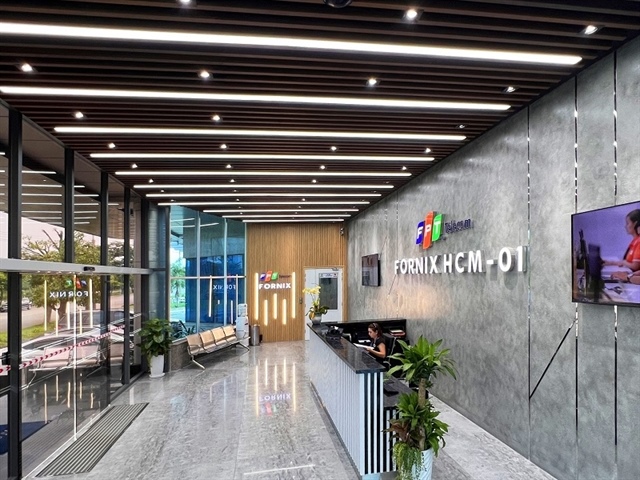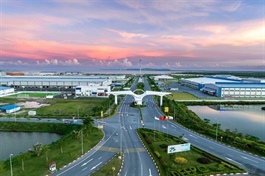Data Law aims to protect data and unlock value
Data Law aims to protect data and unlock value
The legislation marks the first time data is recognised as a property right under Vietnamese law.

Inside the lobby of Fornix HCM01 in Tân Thuận, HCM City. Photo courtesy of FPT |
The 2024 Data Law, which aims to regulate the collection, sharing and commercial use of data, creating a trusted marketplace while enhancing personal data protection and cybersecurity, takes effect today, July 1, 2025.
The legislation marks the first time data is recognised as a property right under Vietnamese law. It sets clear responsibilities for regulatory authorities, data platform operators and data owners. Notably, it allows official data exchanges operated by licensed State-owned enterprises or public service units. These exchanges are expected to provide a secure environment for data transactions, reduce fragmentation and enhance trust in data reuse and commercialisation.
According to Article 42 of the law, datasets that are anonymised, non-personal or explicitly authorised by their owners may be traded. The law prohibits transactions involving data that threaten national defence and security or that are traded without the consent of the owner.
Tradable goods
Under the new legal framework, data may be treated as a commodity once ownership is clearly defined, transactions are lawful, and the owner has consented in cases involving personal information. Eligible datasets include anonymised consumer behaviour data, supply chain and logistics information, sensor data from smart agriculture and industry, as well as open government data and market trends.
Industry experts believe that data for business analytics, operational optimisation and AI training will likely be most sought-after on the exchanges. Datasets offering high commercial value include financial data, e-commerce trends, real estate analytics and sector-specific insights, provided they meet legal, security and transparency requirements.
To ensure safe and responsible use, data exchanges must be operated under a strict supervision framework. The State is expected to control core infrastructure, approve licences and enforce a pre- and post-audit regime. Security measures will include multi-layered encryption, risk assessments, and compliance with the Law on Cybersecurity and the Law on Information Security.
Businesses in artificial intelligence and digital services have welcomed the new legal framework. MISA, a leading Vietnamese software firm, sees data exchanges as a breakthrough for AI development.
“Access to diverse and lawful datasets will improve the accuracy and personalisation of our AI assistant MISA AVA,” Vice Chairman Board of Directors at MISA JSC, Nguyễn Xuân Hoàng told the VnEconomy.
“Instead of spending time and resources to collect and clean fragmented data, we can use standardised, anonymised and owned datasets under the new law.”
The company plans to consume and contribute anonymised data on the platform, creating a sustainable data exchange ecosystem.
Rikkeisoft, a digital transformation consultancy, said that exchanges will significantly reduce data acquisition costs and support the development of AI and machine learning solutions across sectors such as finance, transport and manufacturing.
“It also opens up new partnership opportunities within Việt Nam’s emerging data ecosystem,” said Ngô Minh Quân, Rikkeisoft's Director of Digitalisation.
Hybrid model
Experts recommend a phased approach for developing data exchanges, beginning with a centralised model managed by the State. Initial operations may focus on public datasets such as census data, tax records and trade statistics. Once standards and legal guidelines are firmly established, the system could evolve into a hybrid model that allows private participation and decentralised exchanges.
According to Phygital Labs, a firm developing digital identity solutions, data exchanges will play an important role in defining, verifying and trading digital assets securely and transparently. The firm sees opportunities to integrate its digital wallets and asset management platforms into the ecosystem.
Cốc Cốc, a Vietnamese tech company offering web browsing and advertising services, also views the development as a game-changer.

Inside the lobby of Fornix HCM01 in Tân Thuận, HCM City. Photo courtesy of FPT |
“A lawful data exchange gives us access to high-quality, anonymised datasets that are crucial for AI model training and personalised content,” said Trương Đức Lượng, Chairman of the Cyber Security Joint Stock Company.
“It reduces legal risk and strengthens user trust, which is essential in the digital age.”
The 2024 Data Law is a critical step in Việt Nam’s long-term vision for digital transformation and innovation. It aligns with Resolution 57 of the Politburo, which promotes science, technology and innovation, and with Resolution 68, which positions private technology enterprises as a key driver of economic growth.
The law introduces principles of transparency, security and simplicity in data sharing and requires systems to issue risk warnings, control access, and protect personal privacy. It also defines criteria for commercial data, including legal ownership, reuse potential and value creation.
Internationally, various models of data exchanges have emerged, from centralised government platforms to sector-specific and decentralised markets. Việt Nam’s approach is expected to be adaptive, combining public oversight with private-sector innovation.
According to government officials, in this particular context, data is an economic asset and the law helps shift data from scattered, underused resources to structured, valuable and legally protected assets.
By institutionalising data ownership and defining rules for trade and use, the law is expected to spur responsible data exploitation, encourage investment in local data infrastructure and foster a national data ecosystem that is safe, open and innovation-driven.
- 07:48 01/07/2025
























